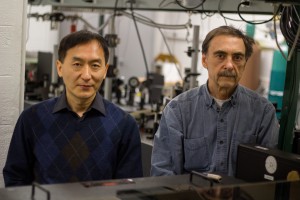Two UR researchers have developed an entirely new method for waterproofing metal surfaces. Professor of Optics Chunlei Guo and senior scientist Anatoliy Vorobyev used high-powered, short-pulse laser treatments to create micro- and nanostructures that effectively repel water from the treated surfaces.
This method involves using a laser with only a few millijoules of energy, distributed over such a short time frame so as to create a power output of gigawatts or even terawatts.
“We used this high-powered laser, a very, very high-intensity laser beam, and zapped the metal’s surface,” Guo explained. “Wetransformedasmoothmetal surface to a highly textured one. It consists of nanostructures, microstructures, on both scales.” The metal’s surface remains smooth to the touch, and appears smooth to the naked eye, but it interacts with water in a drastically different way.
Guo noted that the new technology is markedly different from existing hydrophobic coatings, such as Teflon or chemical sprays. A Teflon pan, for instance, must be tilted almost 70 degrees before water droplets will begin to slide off the surface. Guo’s super- hydrophobic metals, on the other hand, need only be tilted as little as five degrees to remove water. Guo stressed that the laser treatment involves altering the intrinsic structure of the metal, rather than applying chemical coatings to the surface.
“A problem for coatings is that it will wear off over time,” he noted.
Besides repelling water, the treated metal is energy absorbent (by virtue of its black color) and self-cleaning, making it ideal for use in solar panels. Guo pointed out that, because water is repelled from the metal’s surface, the material is ice-, rust- and corrosion-resistant. He also said that, if applied to the outside of a watercraft, the super- hydrophobic material would reduce friction with the water and make the vessel incredibly streamlined.
“You can imagine that if you coat a ship body with this super-hydrophobic surface […], the water will slide right off. The ship’s travel would be much faster and more efficient,” Guo explained.
Guo’s work has received a great deal of media attention, both locally and nationally. Four Rochester area news studios have come to the University campus to interview him, and Guo was also featured on the NPR radio program “Science Friday” on Jan. 23.
“It was a great experience,” Guo said. “I listen to Science Friday on NPR all the time.” He noted that while his research has been covered in the media before, the recent development of super- hydrophobic structures has received much more attention on social networking sites such as Facebook and YouTube.
This latest invention stems from Guo and Vorobyev’s earlier work with super-hydrophilic or “water-loving” surfaces, which attract water so strongly that a droplet of water can actually be caused to flow upward, against gravity, on the treated materials. These super-hydrophilic surfaces can direct the flow of water with great precision, and could be used to make more efficient water-cooled computers.
After developing the technique for super-hydrophilic surfaces, Guo and Vorobyev worked to apply the treatment to other materials. They succeeded in creating super- hydrophilic surface structures on semiconductors, dielectrics and even human teeth. The next step in the current research, Guo said, is to apply the super- hydrophobic properties to a wider range of materials.
Passanisi is a member of
the class of 2017.






